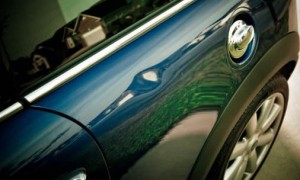Cramped parking spaces are costing motorists approximately £500 million in repairs as careless drivers dent doors and bash bumpers.
According to a study, more than ten million car owners have returned to a parking space to find their car damaged after another driver has swung open a door and hit their paintwork or banged the wing mirror.
And shoppers at supermarkets are also to blame for squeezing through narrow gaps between cars with metal belt buckles and bags catching on paintwork and mirrors.
The survey by high street chain Halfords found two out of three drivers shell out more than £50 for minor repairs for scuffs and scrapes with 50% of damage to the car body.
Bumpers are also vulnerable, accounting for 14% of repairs and mirrors make up another 13%.
Despite the size of the average car growing, Department for Transport rules governing car park space sizes have remained the same since 1994.
Modern cars can be up to two inches wider than the 5ft 11 inch minimum space recommended by the government department, meaning even a Ford Focus at 6ft 1in wide is too large to fit a regulation bay.
And at 6ft 7ins wide, a BMW 3 Series would need to straddle two tiny spaces to have any chance of parking safely.
Halfords spokesman David Howells said: “There is a squeeze on the nation’s car parks and the consequences are hitting frustrated motorists hard earned money.
“The majority of drivers we questioned blamed their scratches and repair costs on inconsiderate drivers parking too close to them but our research shows that the actual size of parking spaces is leaving them little choice.”
Donna Howard of paint protection experts G3 Pro said: “Even the smallest scratch can be very annoying and reduce the value of a car by hundreds of pounds.
“But with car park operators looking to maximise visitor volumes and revenue, there is little incentive for them to exceed the recommended minimum size requirements.”
The survey of 2,187 motorists found that local supermarkets were the worst for cramped bays with shopping malls second and railway stations in third place.

